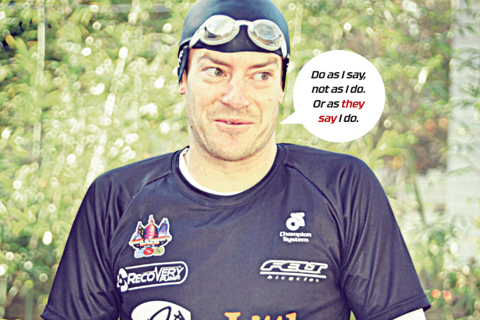Don’t Always Listen to the Pros – Figuring out what information to trust

Recently, I read a triathlon forum thread about how professional triathletes train: how much, what they/we do, what they/we don’t do, and so forth. With respect to this topic, let me make one thing clear—don’t always listen to the pros! You may wonder at this; after all, aren’t I (a pro) giving you this advice? I’ll give you two reasons. In today’s information age, interested amateur athletes get much more news about the professionals than ever before. Every athlete has a Twitter account, website, and blog. On-line media outlets try to keep a flow of new content to their sites daily. Because there is not enough racing news to keep Twitter, blogs, and triathlon websites fresh 24-7, mainstream and social media report on professionals’ lifestyles and training regimes. There are more avenues for people to get information or, more importantly, misinformation, about athletes than ever before. So, therefore, 1) the information you have is probably not accurate and 2) just because a professional does it doesn’t mean it’s right for you.
Personally, I don’t have a problem with this trend toward information overload; in fact, I think it’s great for the business, the professionals, and their sponsors. Through blogs and social media, our lives become a sort of reality show for those who wish to follow. As professionals, it’s important for us to continue to get exposure for our sponsors’ brands.
Where I take issue is when amateurs take to heart too much of what they hear or read about anything that professionals do or don’t do when it comes to training, racing, or nutrition. People talk about how one athlete trains only with quality and not quantity, another wins championships training with unbelievable volumes, or about how strictly or loosely an athlete follows a nutrition plan. Remember that what you hear is often a partial truth and that your needs and history are different from other athletes, so how that professional trains is right for him or her and not necessarily always something that you should incorporate in your own training.
Rather than believe a single narrative, I try to take in multiple angles and then look for commonalities. Stories are always floating around about how any successful athlete trains. Rather than emulate that one person’s training into my regime, I look for consistency of themes across many successful athletes. I’ve incorporated a few of these common threads into my training over the years, but I did it because I found consistent messages regarding a variety of athletes and coaches that I encountered time and time again rather than chasing fads.
We must all be careful when it comes to what we believe. I recently read an article about an Olympic runner’s training. It stated this medalist only runs 65 miles per week at the most, quite low by professional distance runners’ standards. I was discussing it with a professional athlete friend, and the first thing he said was to not believe the article. He had lived in the same city as the athlete and said he saw him running the same 12-mile loop at a very easy pace every morning. Knowing that he must also do intensity sessions to be as fast as he is, it doesn’t take a math whiz to come to the conclusion that this article was probably off the mark.
Another friend was traveling with a former Ironman World Champion. They were sitting at a gate on a layover between flights. He told me he read an update on his Twitter from the athlete next to him that stated something like “Just smashed a four-hour bike ride with the boys; that was a tough one.” Wrong. He was sitting in an airport, playing up the persona of putting in hard training hours to his 100,000+ followers.
One final example of spreading misinformation involved a different multi-time Ironman World Champion. He was spotted over several summers in Boulder on his runs in a black, long-sleeved running shirt. Immediately, it spread through the triathlon media that he was doing this to acclimate to the heat for the Ironman World Championships in Kona, Hawaii. There were athletes who then tried to copy this, believing that this was indeed his reasoning. Someone close to this athlete later told me that he’d run in a long-sleeved shirt to keep the sun off his arms for skin cancer protection and his clothing sponsor only made a black long-sleeved top, not a white one, so that’s how he trained. Maybe the information I have is wrong or the truth is a combination of both, or perhaps reality lies somewhere in the middle—who knows?
I’ve heard so many suspect or false stories about how people do or don’t train and what they do or don’t eat that I could fill more pages than you’re willing to read. What I’ve learned is that there is always some kernel of truth in what you read or hear but more often, it’s a distortion of reality. Athletes shape the messages to what they want you to know or think about them. Sometimes a factoid gets overblown through multiple retellings. The truth is, in men’s professional triathlon history, there have only been 17 different male winners of the Ironman World Championships, four Olympic gold medalists, and 15 ITU World Champions (short distance). Only they, their loved ones, coaches, and closest training partners really know what it took and what they did when it came to training, nutrition, and racing to be the absolute best.






